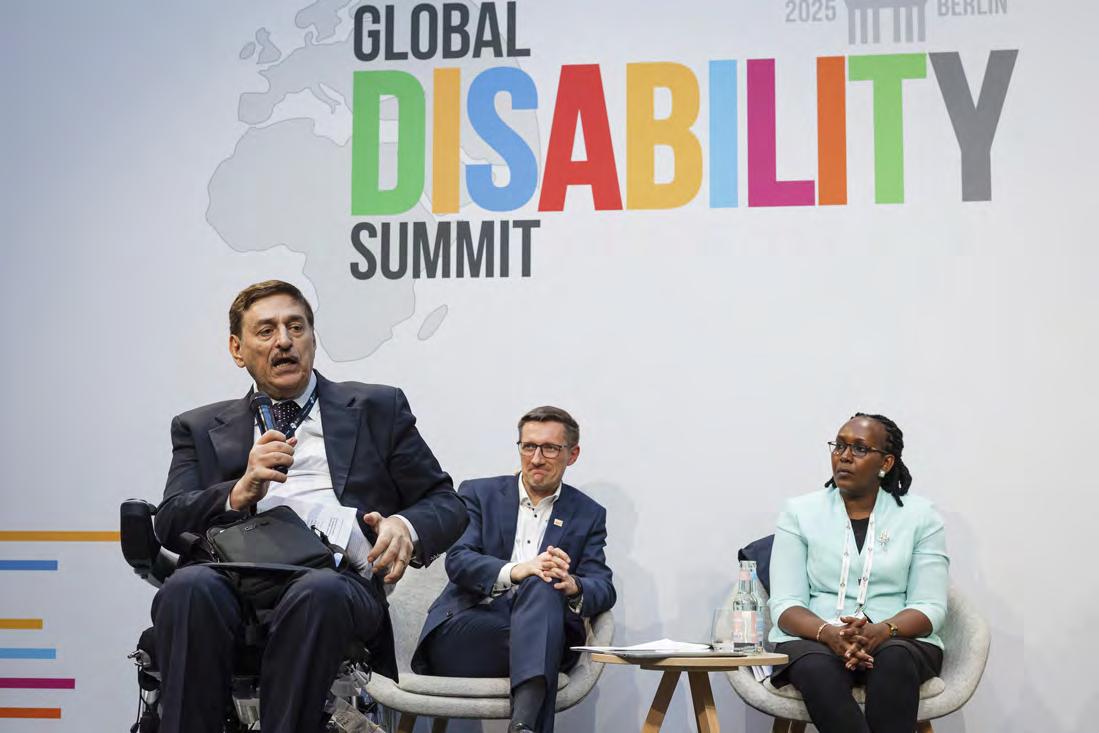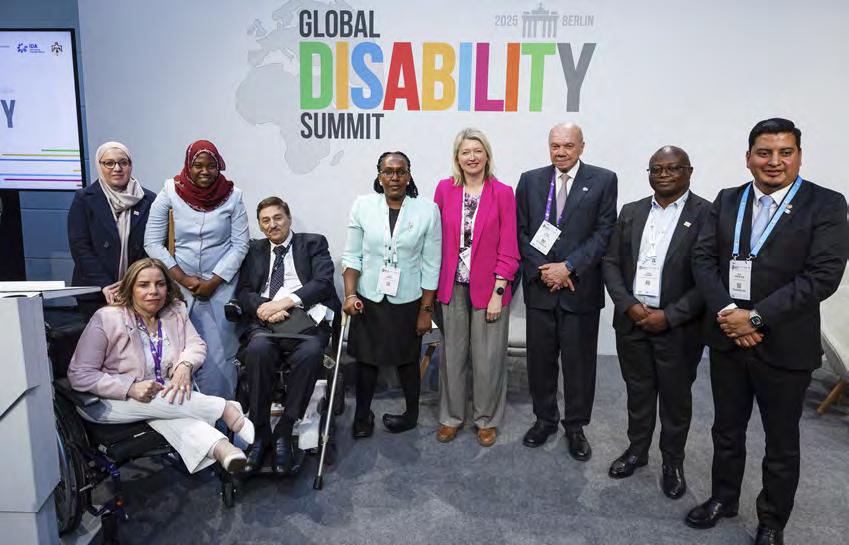
7 minute read
ADVANCING DISABILITY PARTICIPATION
Participation of persons with disabilities in Commonwealth parliamentary processes and networks influences social inclusion. This promotes representation of their interests as their input is reflected while making policy decisions.
Hon. Timothy Wanyonyi, MP is a Member of the Kenya National Assembly since 2013 and the Commonwealth Parliamentarians with Disabilities (CPwD) Regional Champion for the CPA Africa Region.
I had the opportunity of attending the 3rd Global Disability Summit (GDS) from 2 to 3 April 2025, held in Berlin, which gathered more than 4,500 participants from 100 countries. In my capacity as the Chair of the Kenya Parliamentary Association (KEPIDA) and the Commonwealth Parliamentarians with Disabilities (CPwD) Regional Champion for the CPA Africa Region, I also attended a side event at the GDS with the theme of ‘Advancing disability inclusive development through intensified parliamentary engagements and parliamentary networks’. The Commonwealth Parliamentarians with Disabilities (CPwD) Chairperson, Hon. Laura Kanushu, MP (Uganda) who highlighted the work of the network and the importance of promoting inclusive Parliaments, and the Uganda Minister of Disabilities, Hon. Asamo Hellen Grace, MP, were also in attendance.
The Summit resulted in 800 new commitments from governments, development actors, private sector organisations and civil society as the GDS aims to galvanise global efforts to realise disability inclusion around the world. It is a mechanism bringing together a wide variety of high-level stakeholders, engaging and discussing the progress in disability inclusion: governments, multilateral agencies, the private sector, academia and civil society organisations, and organisations of persons with disabilities and foundations.
Prior to the GDS, I was also in attendance at the African Regional Summit in Kenya. Regional presummits are an integral part of the GDS, building momentum towards the main event in Berlin, and contributing to the mechanism through regionally focused conversation and commitments mobilisation. As the first regional event for the GDS 2025, the African Regional Summit emphasised Africa’s key role in global disability inclusion, building on the momentum from the 2018 and 2022 Global Disability Summits.
The objectives of the African Regional Summit included building shared understanding of the current challenges and priorities of persons with disabilities in the African region and highlighting such context within the GDS framework, bringing together governments, development actors, civil society organisations (CSOs), along with the private sector, to share learnings and experiences from the previous GDS cycles and provide recommendations going into 2025.
This Summit resulted in multilateral collaboration as the Kenyan government, British High Commission, the United States Embassy, and the hosts and co-hosts (African Disability Forum (ADF), International Disability
Alliance (IDA), and the German Federal Ministry for Economic Cooperation and Development (BMZ)) called on sustainable funding and stronger global cooperation on disability rights, as well as strategic discussions on Africa’s progress since GDS 2018 and 2022, assessing the implementation of past commitments.
At the Global Disability Summit, discussions covered core disability inclusion themes including accessibility, equal participation and inclusion, employment and economic empowerment, humanitarian action and disaster risk reduction, legislation and policy reform, and overall monitoring and accountability.
Dr Nawaf Kabbara, President of IDA, emphasised the central role of Organisations of Persons with Disabilities (OPDs) in shaping global policies which reiterates the necessity of the rights-based approach to inclusion and urgency of addressing gaps that persists in policy and practice. Olaf Scholz, Federal Chancellor of the Federal Republic of Germany, shared Germany’s plan to uphold 15% funding target even at a time where many states are backtracking on disability inclusion. He expressed appreciation for Jordan and IDA’s leadership and collective action in driving meaningful change throughout the GDS. His Majesty King Abdullah II of Jordan spoke about OPDs in the realisation of disability inclusion, and the importance of addressing disability inclusion in situations of risk and humanitarian emergencies. Amina Mohammed, United Nations Deputy Secretary-General, voiced worries that the progress on disability related Sustainable Development Goals (SDGs) is slowing down, and in some areas, moving backwards, and emphasised the urgent need to address these concerns in the next five years.
The second opening session on ‘Voices of Inclusion’ highlighted pathbreaking initiatives that have the potential to positively change outcomes of persons with disabilities which are rooted in the OPD participation.
The session on ‘Shaping Inclusive Labour Markets and Decent Work for Persons with Disabilities Worldwide’ focused on creating more inclusive and accessible job markets, and on related topics such as equipping persons with disabilities with the necessary skills and building employer capacity to meet the United Nations Convention on Rights of Persons with Disabilities (UNCRPD) and the International Labour Organisation (ILO) standards. Fatma Wangare, Country Director of the Kenya Association of the Intellectually Handicapped (KAIH), discussed innovative solutions in advocacy, policy, practice and partnerships to enhance disability equality and economic empowerment. The panellists also explored what must change globally to improve employment prospects for people with disabilities.
At the ‘Launch of the Resilient and Inclusive Cities Hub (RICH): Because the Cities of the Future Need to Work for All’ session, discussions centred around how urban areas must adapt to inclusivity, ensuring that no one is left behind, especially people with disabilities, who face disproportionate risks from disasters, harshening environmental conditions, lack of consideration during reconstruction efforts, inaccessible infrastructure and exclusion from planning processes. RICH focuses on integrating inclusion and resilience into urban development, disaster risk reduction as well as recovery and reconstruction efforts, accessibility gaps, and ensuring meaningful participation of persons with disabilities in all phases of urban planning and governance. The aim is to foster partnerships, drive innovative projects and build a global knowledge sharing platform to disseminate best practices for disability-inclusive urban resilience.
The side event on ‘Advancing Disability-Inclusive Development Through Intensified Parliamentary Engagement and Network’, organised by the Christian Blind Mission (CBM) and the IDA focused on the recognition of the culture of equality, inclusion and human rights in the development of election laws and establishment of political parties. There should be disability mainstreaming in policy and laws enacted by Parliaments as well as advocacy strategies to bolster the number of persons with disabilities that participate in campaigns for elective seats. There should also be a strengthening of disability leagues in political parties to bolster representation of persons with disabilities, which can lead to the election of persons with disabilities into Parliament. International parliamentary consortiums should practice disability inclusion in all their administrative and structural activities as well.

In May 2025, the Parliament of Kenya passed the Persons with Disability Act 2025, which is a comprehensive legal framework promoting and protecting the rights of persons with disabilities. The Act aligns our disability statute with the CRPD and ushers in an era of a rightsbased approach to disability, dignity and the full and effective participation of persons with disabilities in all aspect of life. It also recognises the legal capacity of persons with disabilities, bolsters affirmative measures, provides lifetime income tax exception certificates for those with permanent disabilities and tax relief for parents and caregivers, and stipulates strict penalties for violations of rights of persons with disabilities.
The KEDIPA has been at the forefront of this transformative legislation and is further evidence of the influence of organisations for persons with disabilities.
As a Commonwealth Parliament in Kenya, we will strive to make humanitarian action inclusive of, and accessible to, persons with disabilities, as required by Article 11 of the CRPD, the Sendai framework for disaster risk reduction, Security Council Resolution 2475 (2019) on the Protection of Persons with Disabilities in Conflict and the Inter Agency Standing Committee (IASC) guidelines on the Inclusion of Persons with Disabilities in Humanitarian Action.
From the third Global Disability Summit, as a Commonwealth Parliament, we committed to promoting partnerships with relevant stakeholders including national disability inclusion actors, the private sector, trade unions, academia and civil society to foster disability inclusion. These partnerships will be based on mutual learning and exchange to encourage greater research and both bilateral and multilateral funding for disability inclusion and related matters, including assistive technology and artificial intelligence.










